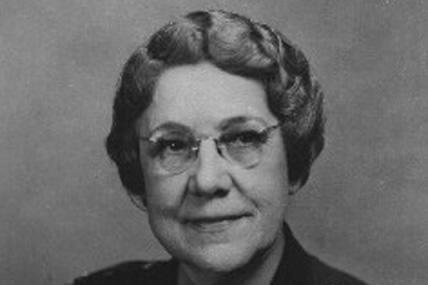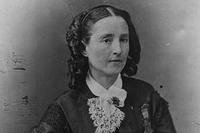Of the many thousands of women who served as military nurses during World War II, not one received the same rights, privileges or pay as her male counterparts of equal rank. The comptroller general declared that, under the laws which governed military pay, "Women were not persons." This did not sit at all well with Lt. Col. Florence Aby Blanchfield, the formidable supervisor of the Army Nurse Corps. While the government may have considered Blanchfield to hold rank in name only, she did not agree. She struggled to achieve full military rank and privileges for herself and all military nurses.
Blanchfield, born in West Virginia, attended nursing school in Pittsburgh, Pa., and nursed in the Panama Canal Zone and for U.S. Steel, among others, before joining the Army in 1917. She was sent to France with Base Hospital #27, eventually serving as Acting Chief Nurse of Combat Hospital #15 before separating from the Army in 1919.
Blanchfield re-upped in 1920 and accepted tours of duty in the U.S., the Philippines, and China before coming to Washington, D.C., as a staff officer for the U.S. Surgeon General in 1935. In 1943, she was named the supervisor of the Army Nurse Corps (she had been Col. Julia Flikke's second-in-command).
It was under Blanchfield's administration that the Army Nurse Corps expanded from 1,000 to 57,000. Nurses served in theaters in Europe, Africa, Asia, and the Pacific -- and suffered the highest casualty rate of all the war's servicewomen. Eighty-three were taken prisoner of war, and 201 nurses died, 16 as the direct result of enemy action. Some 1,600 nurses were decorated for their wartime service.
In 1945, Blanchfield was awarded the Distinguished Service Medal. She must have found it ironic that in 1944, Congress nearly voted to draft women into the nurse corps -- yet did not consider them worthy of real military status.
At long last, in 1947 the Army-Navy Nurse Act declared that nurses would receive all the benefits of military rank. On July 18 of that year, Col. Florence Aby Blanchfield became the first woman to receive a regular Army commission. She was "pinned on" by none other than Gen. Dwight D. Eisenhower.
Blanchfield retired from active duty soon after, but continued her efforts in nursing education. She was buried with full military honors in Arlington National Cemetery in 1971, and has a hospital named for her at Fort Campbell, Ky.












